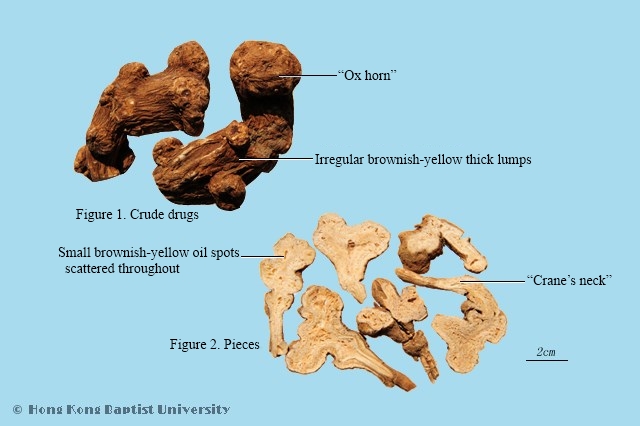|
白朮 Baizhu

|
Chinese Name |
白朮 |
|
|
Chinese Pinyin |
Baizhu |
|
English Name |
Largehead Atractylodes Rhizome |
|
Latin Pharmaceutical Name |
Atractylodis Macrocephalae Rhizoma |
|
Category |
Roots and rhizomes |
|
Origin |
The dried rhizome of Atractylodes macrocephala Koidz. (Compositae). |
|
Production Regions |
Primarily produced in the Chinese provinces of Zhejiang, Hunan, Hubei, Anhui. |
|
Macroscopic Features |
Fist-shaped lumps, 3~13cm long, 1.5~7cm diameter. Externally grayish-yellow or grayish-brown, with growth-like projections and intermittent longitudinal wrinkles and rootlet scars; apex has remnants of stem base and sprout scar. Hard, not easily broken; fractured surface is not flat and yellowish-white to pale brown, with brownish-yellow oil spots scattered throughout. Clean fresh aroma odor; taste sweet and slightly scrid, sticky when chewed. |
|
Quality Requirements |
Superior medicinal material is large, firm, with yellowish-white fractured surface, and a potent aroma. |
|
Properties |
Bitter, sweet; warm. |
|
Functions |
Fortifies the spleen, boosts qi, dries dampness, promotes urination, stops sweating, calms the fetus. Apply to deficiency-weakness of spleen, anorexia, and abdominal distension, and loose tools, dizziness induced by phlegm and retained fluids, edema, spontaneous perspiration, restless fetal movement. |
|
Technical Terms |
‘Ox horns(ru yi tou)’: This refers to the numerous growth-like projections on whole pieces of bai zhu, two portions expand laterally from the lower portion of the rhizome, giving the appearance of traditional female hair buns known as ‘ox horns’. It is also called yun tou, literally ‘cloud head’.
‘Crane’s neck(he jing)’: This refers the ‘white crane’ shape of the bai zhu rhizome, which sometimes still had remnants of the above-ground stem, and is said to be like a crane’s neck. Due to the woody nature of the stem, this feature also resembles legs, and so it is sometimes called ‘bai zhu legs(bai zhu tui)’. |
| Link |
 Medicinal Plant Images Database Medicinal Plant Images Database
 Phytochemical Image Database Phytochemical Image Database
 Chinese Medicinal Formula Images Database Chinese Medicinal Formula Images Database
 Chinese Medicine Specimen Database Chinese Medicine Specimen Database
|
|
Permanent URL:https://sys01.lib.hkbu.edu.hk/cmed/mmid/detail.php?pid=B00032 |
|
|

